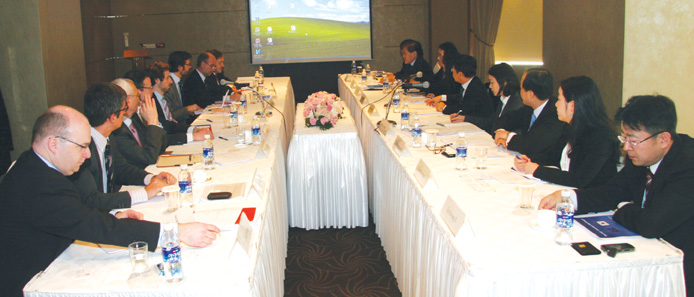Korea, EU Talks on Steel
Both sides agree on continued cooperation to seek sound environment for steel trade and iron ores supply

The Ministry of Knowledge Economy said the 8th Korea-EU civilian steel talks took place at Hotel Lotte on March 19 with Director Lee Seung-woo of the Metals Chemicals Division of the Ministry of Knowledge Economy and Peter Klein, head of the Trade Dep't of the EU Executive Committee leading the two countries delegations made up of officials of steel makers and government officials.
On the Korean side included those from the Korea Iron and Steel Association, POSCO and Hyundai Steel Co. Dongbu Steel and Union Steel-altogether totaling 20 participants and the EU side included representatives of Eurofer, ArcelorMittal, Dillinger and Federacciai-10 altogether.
Major topics discussed at the meeting included matters related to setting up a joint venture iron mining company between BHPB and Rio Tinto to hear opinions of the two delegations at the meeting as the joint-venture firm would have a great impact on the iron ore mining around the world.
The meeting also took up such issues as the policies to cope with climate change and green growth and the steel makers of both sides to cope with the issues and the matters related to glut in steel products around the world.
Steel makers in both countries expressed a great concern on the iron ore mining j.v. announced in October, last year and discussed the possible impact on the world iron ores supply as the two mining companies command 38 percent share of the iron ores mining in the world and the merger of the two mining companies would cause a serious problem on the world iron ores production and supply.
Both sides also noticed a 24 percent reduction in steel trade between Korea and EU last year compared to those in the previous year. Korea exports of steel to EU countries amounted to $178.8 billion and imports of steel from EU $76.9 billion in 2009 while steel exports amounted to $124.2 billion and imports $68.7 billion in 2008.
Both sides agreed that irrational import regulations would be held to the minimum as much as possible as both sides want to develop sound and invigorating trade environment between Korea and EU so that illegal trade practices such as anti-dumping would not occur with traders always be aware of the fact.
Both sides also agreed on the need for the steel industries both in Korea and EU also take the low-carbon and agreed growth as another challenge in their paths of growth with climate change and other related issued coming to the fore.
The delegations at the meeting also saw eye-to-eye on cooperation on the development of technologies for hydrogen recycling steel production and other large products as the environmental problems are global issues and common problems for all the countries in the world.
The ULcos Project began in September, 2004 being undertaken by 47 steel companies in 14 countries is aimed at reducing C02 by 50 to 60 percent by 2050 by developing technologies related to bio and hydrogen recycling.
"Korea, too, is set to begin the Green Steel Project to develop the use of hydrogen in steel production jointly with academics, and research organizations in an effort to hold down the generation of greenhouse gas and Co2 at steel plants, with new technologies to be developed later, Director Lee, chief Korean delegate said.
The delegates from Korea and EU also expressed concern that China's restructuring of its old steel production facilities would have a great impact on the world steel trade, together with the steel plant overcapacity worldwide projected at 560 million tons larger than world steel demand, which could force steel prices down and cause trade frictions around the world.
MKE plans to uphold bilateral consultations with major steel production countries such as EU, Japan and China to upgrade mutual understanding for the steel industries and trade trends and strengthen the international cooperative system for diversified areas including environment, raw materials markets including those for iron ores and related areas.
Steel products trade between Korea and EU has been expanding ever since 2006 when Korea recorded trade surplus, but the trade volume went down in 2009 due to the global economic slowdown with steel exports to EU cut 29.8 percent in 2009 at $123.2 billion. Korea's imports of steel from EU in 2009 amounted to $68.7 billion down 10.7 percent with imports of steel bars down 53.9 percent at 29,000 tons. nw
The Korean side led by Director Lee seung-woo of the Metals Chemicals Division of the Ministry of Knowledge Economy and the EU side headed by Peter Klein, head of the Trade Dep't of EU Executive Committee hold the 8th Korea-EU civilian steel talks on March 19 at Hotel Lotte in downtown Seoul.
3Fl, 292-47, Shindang 6-dong, Chung-gu, Seoul, Korea 100-456
Tel : 82-2-2235-6114 / Fax : 82-2-2235-0799